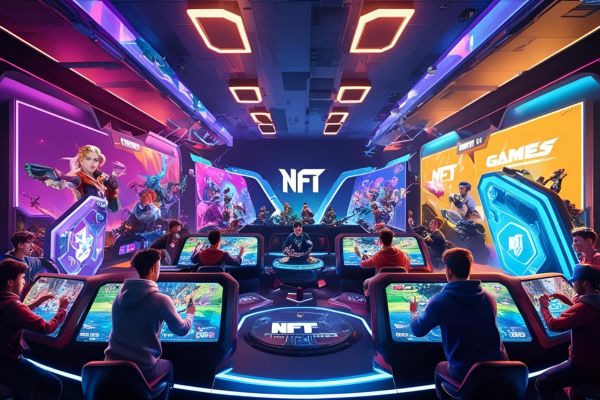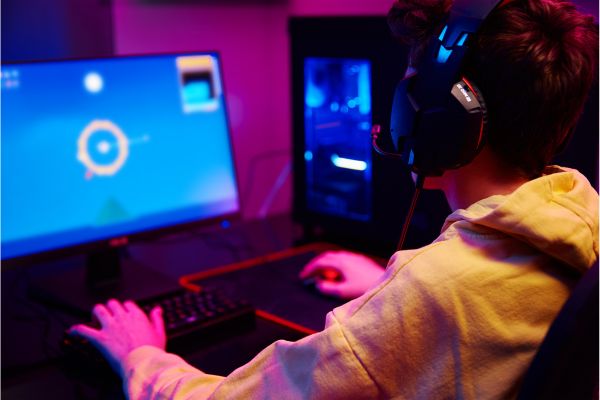The gaming industry is undergoing a major transformation with the rise of NFT games. Unlike traditional games, where in-game assets are controlled by developers, NFT-powered games enable players to truly own, trade, and even monetize their digital items. As blockchain technology continues to evolve, NFT games are introducing innovative ways to earn real-world value, fostering player-driven economies, and creating interconnected virtual worlds.

How NFT Games Enable True Digital Ownership
In traditional gaming, all in-game assets—characters, skins, weapons, and collectibles—are stored on centralized servers. Players can spend hours or even real money acquiring these assets, but they ultimately have no real ownership. NFT games solve this issue by tokenizing in-game items on the blockchain, making them unique, verifiable, and transferable. Players can buy, sell, and trade NFTs across different platforms without restrictions, giving them full control over their virtual possessions.
Play-to-Earn: A New Economic Model in NFT Games
One of the most revolutionary aspects of NFT-powered games is the play-to-earn (P2E) model. Unlike conventional gaming, where players only invest time and money for entertainment, NFT games allow them to earn cryptocurrency and NFTs that hold real-world value. For example, Axie Infinity, one of the most popular NFT games, has enabled players—especially in developing countries—to generate income by breeding, battling, and trading digital creatures. This model has opened new financial opportunities and is shaping the future of gaming economies.
NFT Games and Interoperability Across Virtual Worlds
Another advantage of NFT games is interoperability—the ability to use the same NFT assets across multiple games. Traditionally, in-game purchases are locked within a single game, making them useless if the game shuts down or players switch to another platform. However, with NFT-powered games, assets such as characters, weapons, or land can be utilized across different blockchain-based gaming ecosystems. For example, games built on Ethereum or Polygon allow NFTs to function across different virtual worlds, enhancing cross-game experiences.

Decentralized Marketplaces and Player-Driven Economies
NFT games are shifting the power dynamics in gaming economies by introducing decentralized marketplaces. Instead of relying on developer-controlled stores, players can trade assets freely on blockchain-based platforms. Marketplaces like OpenSea, Rarible, and in-game NFT exchanges enable gamers to buy, sell, and auction in-game items securely. This decentralized approach fosters a transparent economy, allowing players to determine the value of their digital assets rather than being subjected to game developers’ pricing models.
The Rise of Virtual Land and NFT Game Metaverses
NFT games are not limited to just items and characters—many also feature virtual real estate, where players can buy, sell, and develop digital land within game worlds. Games like The Sandbox and Decentraland have created entire economies around virtual land, where users can build businesses, host events, and even rent out spaces. This new form of digital property ownership is redefining the gaming experience, blurring the lines between reality and the virtual world.
How Big Gaming Companies Are Entering NFT Games
The explosive growth of NFT games has captured the attention of major gaming companies. Industry giants like Ubisoft, Electronic Arts (EA), and Square Enix are exploring blockchain integration to create new in-game economies. With massive gaming communities already in place, their entry into NFT-powered games could accelerate adoption and bring blockchain gaming to mainstream audiences.

The Future of NFT Games in the Metaverse
As metaverse platforms expand, NFT games are expected to play a crucial role in digital worlds where players can interact, trade, and build immersive experiences. Companies like Meta (formerly Facebook) and Microsoft are already working on metaverse initiatives, and NFT-powered games will likely be an essential part of these virtual ecosystems. With technological advancements and wider adoption, NFT games could redefine how virtual economies function, making gaming more interactive and financially rewarding.
FAQs
What is an NFT in a game?
An NFT in a game is a unique, blockchain-based digital asset, such as characters, skins, or items, that players can buy, sell, or trade with real-world value.
Do NFT games make money?
Yes, NFT games generate revenue through in-game purchases, trading digital assets, and play-to-earn models, allowing players and developers to profit from blockchain-based economies.
What does NFT stand for?
NFT stands for Non-Fungible Token, a unique digital asset stored on a blockchain, representing ownership of items like art, collectibles, and in-game assets.
What is NFT gaming?
NFT gaming integrates blockchain-based assets into video games, allowing players to own, trade, and earn from digital items, often through play-to-earn mechanics and decentralized marketplaces.
What is the top 1 NFT game?
As of recent rankings, Axie Infinity remains one of the most popular NFT games, featuring a play-to-earn model where players breed, battle, and trade digital creatures called Axies.
NFT Games are Disrupting Gaming
NFT games are disrupting the gaming industry by introducing true asset ownership, play-to-earn models, and decentralized marketplaces. The rise of virtual land, integration with major gaming companies, and the expansion into metaverse ecosystems signal an exciting future for NFT-powered games. As blockchain technology continues to evolve, these games are set to revolutionize how players engage with digital worlds—creating opportunities, fostering innovation, and pushing the boundaries of what gaming can be.



